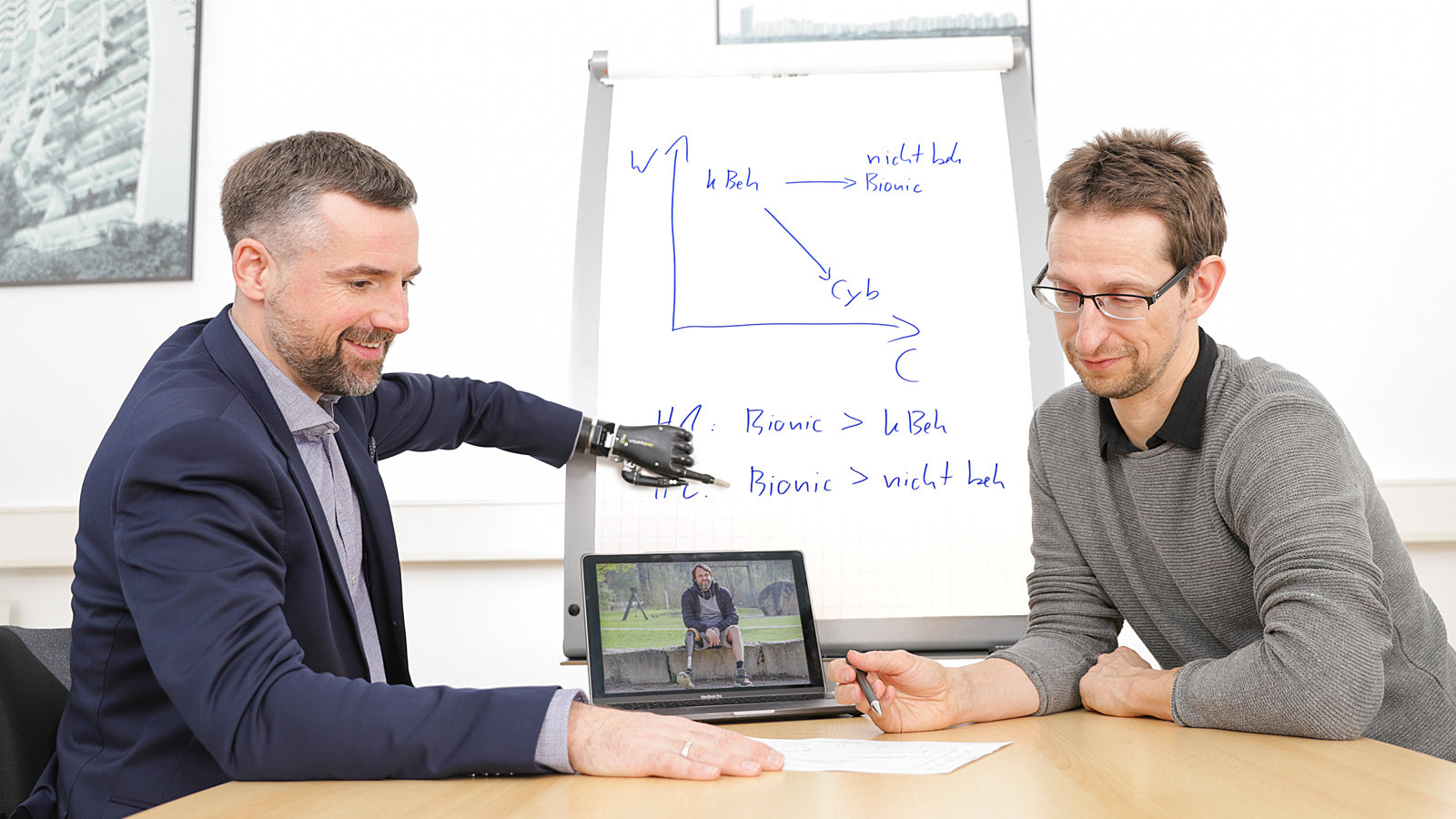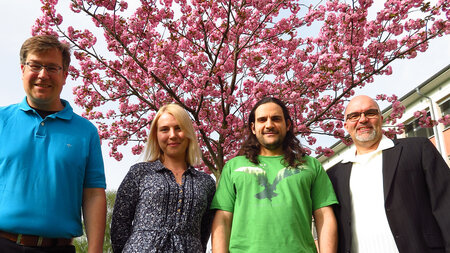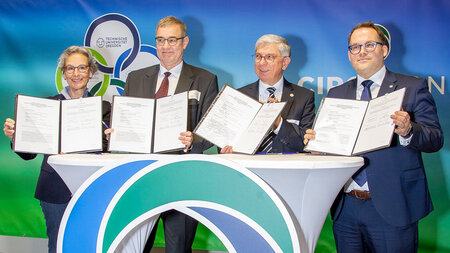Emotionally cold, But Competent
A Chemnitz University study shows for the first time how new bionic technology affects stereotypes of people with disabilities – as explained in a new video by Prof. Bertolt Meyer
-

Prof. Dr. Bertolt Meyer (left), himself a user of a bionic prosthesis, and Junior Prof. Dr. Frank Asbrock have investigated how new bionic technology affects stereotypes of people with disabilities. Photo: Jacob Müller
The basic idea of the common stereotype of people with a physical disability is this: they are nice, however not very competent. Therefore, this group of people is usually treated with compassion. Technical progress could change this view, as shown by a new study from Chemnitz University of Technology. According to the study, people who wear a bionic prosthesis were viewed as being almost as competent as non-disabled persons. This suggests that bionic technology can help offset some of the stigmas associated with having a disability. However, this perception changed quickly when the terminology was switched: when the participants were asked to assess “cyborgs”, aka people with both organic and biomechanical body parts, they were perceived as a threat – as emotionally cold and competent.
This is the first study to examine the relationship between the increasing mechanisation of the human body and stereotypes about it in society. The study was published as open access on 20 November 2018 in the renowned journal “Frontiers in Psychology”. “Our study shows that new technical developments can change the content of stereotypes”, explains Prof. Dr. Bertolt Meyer, Chair of Organisational and Economic Psychology at Chemnitz University of Technology, which focuses on researching the interface between man and technology. Meyer led the study along with Prof. Dr. Frank Asbrock, Junior Professor of Social Psychology.
The Stereotype Content Model as a scientific foundation
“Stereotypes are shared beliefs about members of social groups. For example, the belief that Italians cook good pasta or that senior citizens are hard of hearing”, says Junior Prof. Asbrock, who focuses on the topics of “prejudice” and “group affiliation”. The Chemnitz study is based on the “Stereotype Content Model”, or SCM, which defines the content of stereotypes as two attributions to social groups: the first attribute, “warmth”, indicates whether members of a social group are more likely to have good intentions (warm), or bad ones (cold). Regardless of this rating, the model then rates social groups with higher or lower “competence” to put their intentions into action. For example, pensioners and people with disabilities are credited with good intentions (“warmth”), but with little competence.
The starting point for the study was the observation that people with bionic prostheses are presented in media, pop culture, or sports as particularly competent. “We wanted to investigate whether this observation also leads to conclusions regarding stereotyping in society. Our assumption was that, on one hand, the increasing spread of bionic prostheses leads to greater acceptance, and on the other hand, leads to positive changes regarding peoples’ reservations and stereotypes”, says Meyer, who himself wears a bionic hand prosthesis.
Wide field of measurement and test participants
For their investigation, the two researchers set up six hypotheses, some of them with two subcategories, relating to the stereotyping of people with disabilities, users of bionic prostheses, and cyborgs. The research variables for examining these differences were the categories “warmth/cold” and “competence”. At the core of the hypotheses was the extent to which there are differences in stereotyping in the three groups described.
The results are based on two surveys with over 3,100 responses taken from 401 participants. The participants were between 18 and 70 years old, English-speaking, and from either Europe or the USA. To investigate their hypotheses, Meyer and Asbrock used an online questionnaire for part of the trial. In the other part of the trial, they used an online experiment. As part of the investigation, the two researchers were able to confirm four hypotheses, while the remainder either partially applied or had to be completely dropped.
For example, Meyer and Asbrock were able to show that people with physical disabilities are considered to be more competent if they wear a bionic prosthesis. It was also confirmed that cyborgs were assigned more competence, but at the same time, also more “cold”, both in comparison to people with physical limitations as well as people who are physically healthy. The researchers therefore conclude that the term “cyborg”, a term used for people with disabilities that are compensated for by technology, is not effective, because this designation creates a new, looming stereotype.
The study also shows that healthy people who improve their abilities via technology are negatively judged as cold and of a mediocre competence. This points to the possible social costs of a future merger of humans and technology.
The findings of the study point to the future, against a backdrop of increasing mechanisation in all areas of society: technology not only changes people’s abilities, but also changes how they see themselves and how they are perceived socially.
Multimedia: In a video clip (engl. subtitles), Prof. Dr. Bertolt Meyer explains the results of the study. The clip is available on the Chemnitz University YouTube channel.
On the “TUCpersönlich” (TUCpersonal) podcast, Junior Prof. Dr. Frank Asbrock reports on prejudice research, why he studied psychology, and his personal opinions on the city of Chemnitz (german language only).
Of note: The study, titled “Disabled or Cyborg: How Bionics Affect Stereotypes Toward People With Physical Disabilities” by Prof. Dr. Bertolt Meyer and Junior Prof. Dr. Frank Asbrock is available online as an open access article: https://doi.org/10.3389/fpsyg.2018.02251
For further information: Prof. Dr. Bertolt Meyer, Chair of Organisational and Economic Psychology, Phone +49 0371 531-32972, E-mail bertolt.meyer@psychologie.tu-chemnitz.de; Junior Prof. Dr. Frank Asbrock, Junior Professor Social Psychology, Phone +49 0371 531-31678, E-mail frank.asbrock@psychologie.tu-chemnitz.de.
(Author: Matthias Fejes / Translation: Jeffrey Karnitz)
Matthias Fejes
17.12.2018





